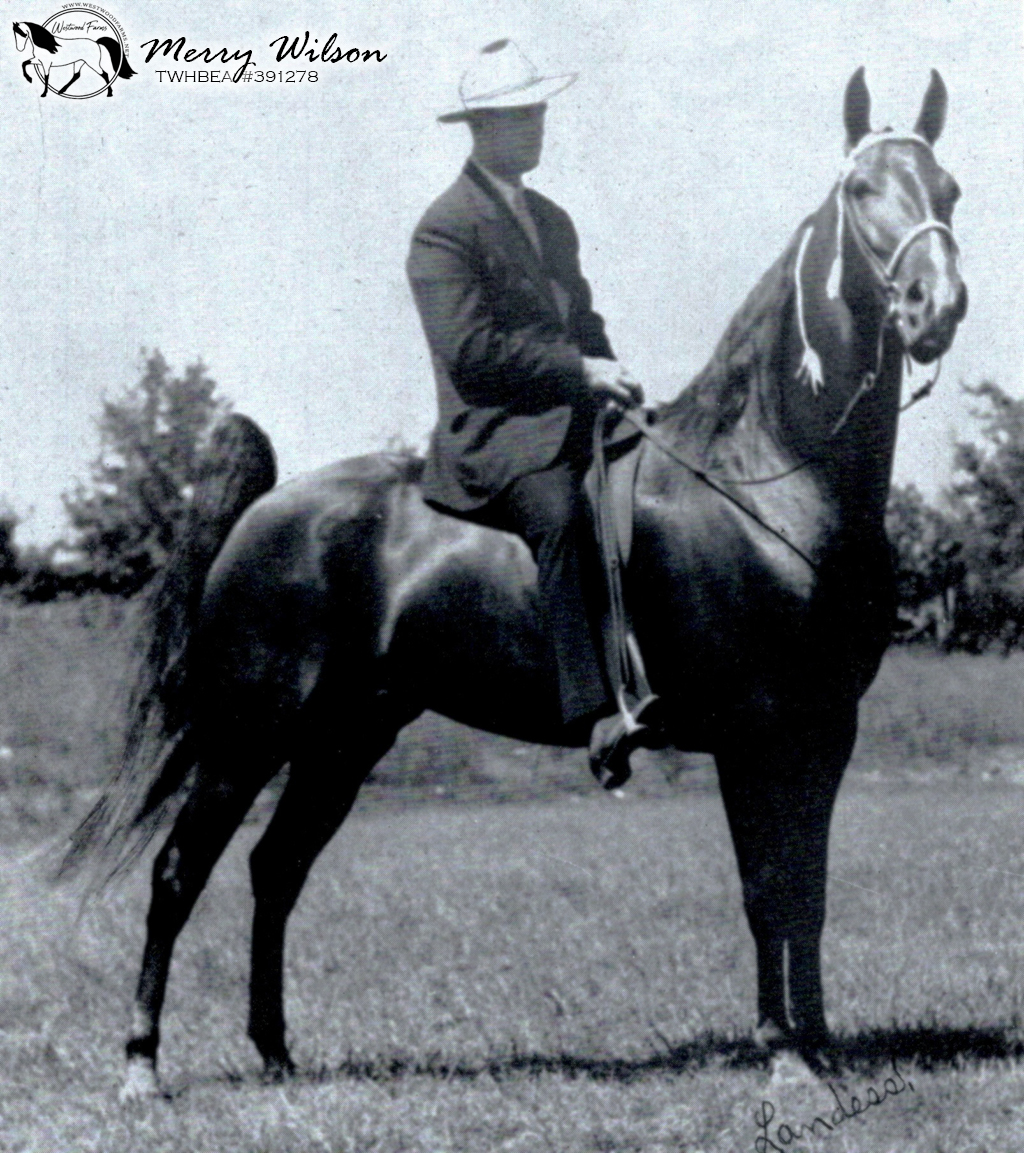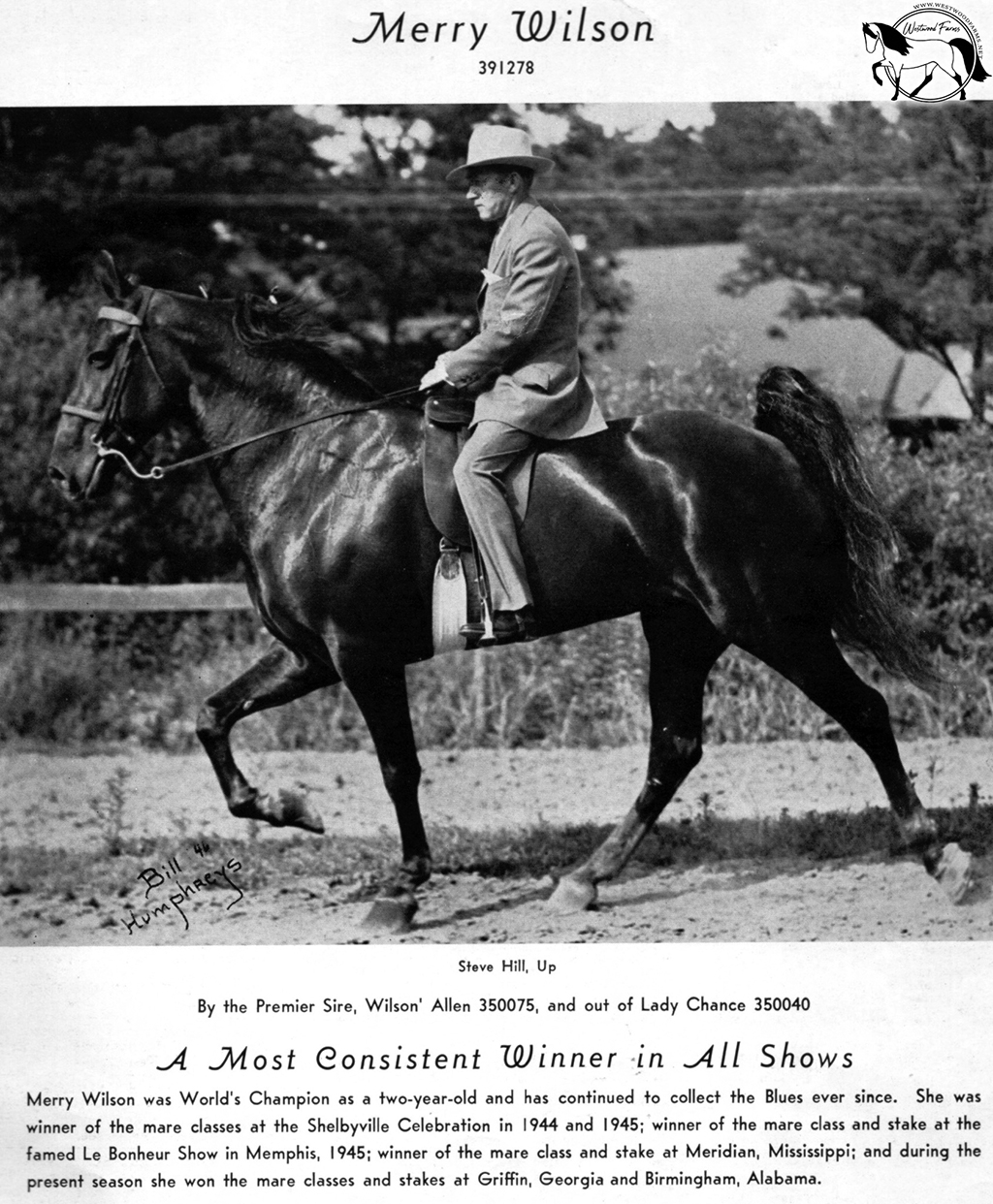|
Merry
Wilson: A Mare Without Equal
(BY Sarah Gee from Walking On Volume 1 Issue 1)
Merry Wilson was the last great show
horse produced by the wildly successful, experimental breeding
program of the legendary Albert Dement of Wartrace, Tennessee.
Foaled in May of 1939, she was by
Wilson’s Allen and out of
Lady Chance who was by Last Chance and out of Nell Don. At
only a few weeks old, she caught the attention of Charles and
Polly Hawkins who were quick to by a half interest in her.
When she was six months old, the filly was weaned, moved to
the Hawkins farm in Woodbury, Tennessee, and given the name
Merry Wilson.
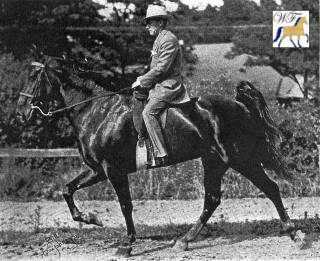
According to Mr. Hawkins, Merry Wilson
was the loosest foal he had ever seen. He was quoted as saying
that she was so loose and had such a big stride that when she
would walk around the pasture she would just about fall apart.
Encouraged by the young mare’s natural ability, the Hawkins
kept her at their place and broke her to ride as a two year
old. She made her show ring debut as a three year old with
Charles Hawkins at the Murfreesboro, Tennessee show where she
earned a fourth place tie. She was then sent to Haynes Haven
Farm to work under the tutelage of Billy Grubbs.
Unfortunately, the mare contracted pneumonia and had to be
returned home.
Once she recovered she was sent to
renowned trainer Floyd Carothers at Wartrace. In their debut
at the Franklin, Tennessee horse show, Carothers and Merry
Wilson were an unimpressive third. Their next outing, however,
had quite a different outcome. In a class full of outstanding
three-year-old mares at the Shelbyville, Tennessee PTA show,
she walked to victory and impressed everyone in the crowd.
Shortly after their successful performance, Floyd Carothers
left to train for Rambo Stables of Fayetteville, Tennessee,
and Merry Wilson returned home to Woodbury.
Mr. Hawkins’ second attempt at showing
Merry Wilson met with little success as the mare refused to
canter. So, after a brief reunion with Billy Grubbs, she found
herself, along with her billy goat stablemate, at Steve Hill’s
barn in Beechgrove, Tennessee. According to Tennessee Walking
Horse industry lore, after arriving at Hill’s, Merry Wilson
solidified her reputation as a very cantankerous and
particular mare.
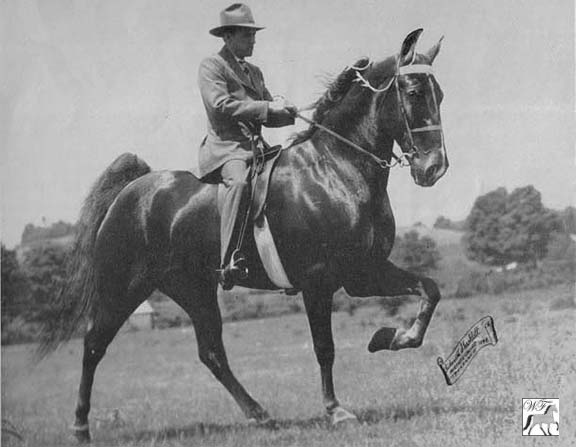 After working her for a few weeks,
Hill made his first show with Merry Wilson at Fayetteville.
She placed second to City Girl but was clearly the winner as
far as the spectators were concerned. Following this show, the
mare became the breed’s newest star. She made such an impact
that the morning after the Fayetteville show Floyd Carothers
bought Merry Wilson for Frank Rambo for $3,500 (Adjusted for
inflation to 2014:$46,877.67). She was sold a short time later
to Dr. and Mrs. J. W. Werner of Jonesboro, Arkansas, and
placed in training with J. B. Smith at Pointer Stables in
Como, Mississippi. Smith showed Merry Wilson to numeroublues
during the 1944 season. After working her for a few weeks,
Hill made his first show with Merry Wilson at Fayetteville.
She placed second to City Girl but was clearly the winner as
far as the spectators were concerned. Following this show, the
mare became the breed’s newest star. She made such an impact
that the morning after the Fayetteville show Floyd Carothers
bought Merry Wilson for Frank Rambo for $3,500 (Adjusted for
inflation to 2014:$46,877.67). She was sold a short time later
to Dr. and Mrs. J. W. Werner of Jonesboro, Arkansas, and
placed in training with J. B. Smith at Pointer Stables in
Como, Mississippi. Smith showed Merry Wilson to numeroublues
during the 1944 season.
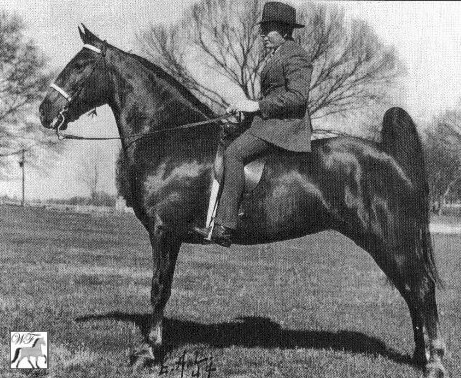 In her first and best shot at the
World Grand Championship at the 1944 Celebration, Merry Wilson
imploded. After an exemplary performance in the mare
preliminary that made her the odds-on favorite to win the
stake, she walked into the grand championship class and acted
up to the point that she had to be taken from the ring. In her first and best shot at the
World Grand Championship at the 1944 Celebration, Merry Wilson
imploded. After an exemplary performance in the mare
preliminary that made her the odds-on favorite to win the
stake, she walked into the grand championship class and acted
up to the point that she had to be taken from the ring.
She went on the win the mare class at
the Celebration a whopping five consecutive times, a feat
still unequaled, but she was never able to lay claim to the
ultimate title. In 1945 she was up against horse of the
century Midnight Sun, in 1946, after returning to Steve Hill’s
barn, an oversight left her off the entry sheet for the big
stake, and in 1947 and 1948, after being sold to Bob
Cunningham for $25,000 (adjusted for inflation to 2014
$270,987.20), she vied for the title against the great
Merry
Go Boy.
Despite her inability to win the
World Grand Championship, Merry Wilson was indeed one of our
breed’s great show horses, winning close to 100 blue ribbons.
She is remembered by those who saw her as having the best flat
walk of all time. According to Tennessee Walking Horse
historian Dr. Bob Womack, who listed her as one of our breed’s
greatest rep - resentatives, “She was undoubtedly the greatest
mare I ever saw.”
|
